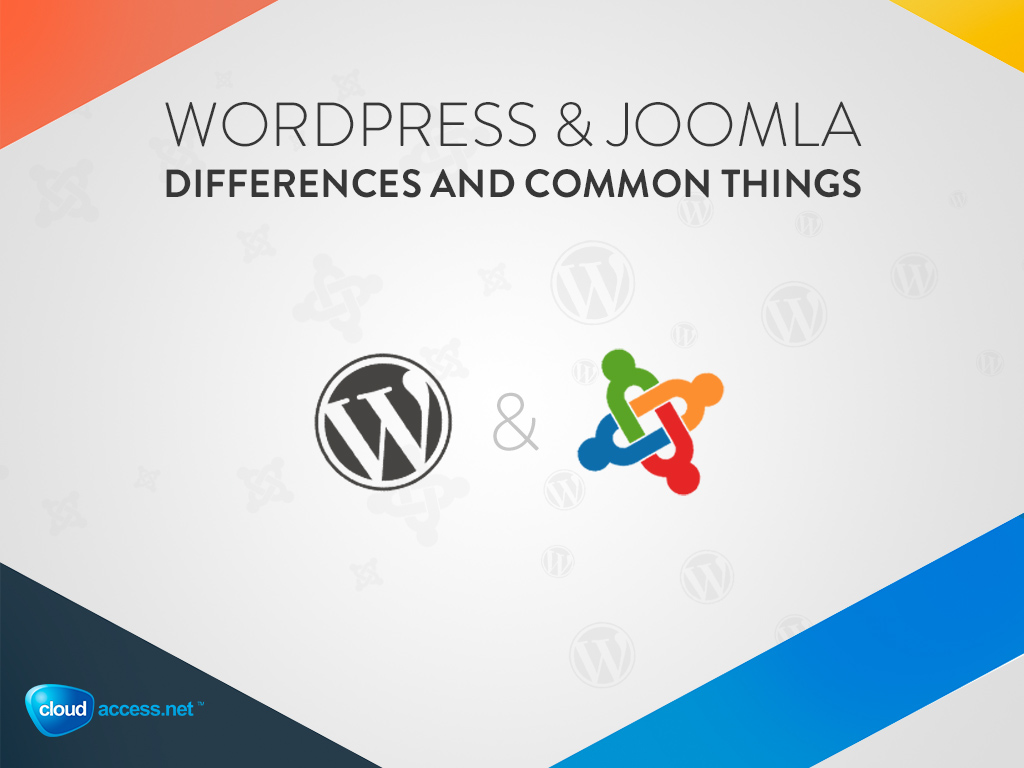Wordpress & Joomla – differences and common things
Wordpress & Joomla
Ah the content management system, the web developer’s answer to the inevitable series of requests to be born after the web 2.0 revolution began with sites like MySpace and Facebook. Once it was clear that websites could be built in which users could gain a superior level of interactivity, the necessity for this functionality became clear in various facets of the web. Everything from social media to eCommerce and everything in-between, with a particular premium being placed upon the ability of users to add content via commenting and other means. This is where the content management system (or CMS for short) came in vogue, and began to make a huge impression on both developers and users alike.
Birth of Joomla
Joomla was actually born when splitting off of Mambo, another content management system in the year 2005. Joomla was born within a non-profit schema, but ultimately there was some tumult regarding the project’s compliance with open source values. In the end the open source, core values persisted however, and the word Joomla itself is actually derived from the swahili word jumla, which translates to all together. These core values hold true to this day, with a vibrant, helpful community continuing to aid in the continuing growth of both the user base and the functionality of the CMS.
Birth of Wordpress
Like Joomla, Wordpress was also born of a fork from the cafelog CMS, and ultimately it persevered by way of catering to users who wanted to create blogs and interact with readers. It was born in the same sphere of Joomla in terms of its open source values, and continues to personify those values to this day. Wordpress’ beginnings can be succinctly summed up in the creation of a CMS for the purpose of creating interactive blogs, but that core functionality has been expounded upon endlessly since its inception in 2003.
What Do Wordpress and Joomla have in Common?
Well, for one thing both Wordpress and Joomla utilize the AMP (Apache, MySQL, and PHP) stack, and this stack can be developed on Windows, Linux, or Mac OS. Each of the aforementioned technologies can be considered both legacy technologies and very, very strongly supported by their respective communities. What this equates to for developers is a vibrant, exceedingly helpful community in any of the aforementioned technologies, as well as both the Wordpress and Joomla CMS.
Taking a closer look at the core tenets of versatility and openness and both hold true for the UX of both Wordpress and Joomla as well, it is clearly a goal on the part of both communities to make it as easy as possible for users to create content. The nearly endless number of plugins (Wordpress) and extensions (Joomla) available for both content management systems equates to an endless set of possibilities regardless of the type of site one wishes to create. While these two CMS have a lot in common, there are some differences that would be key to bear in mind.
Key Differences Between Wordpress and Joomla
In the automotive world, it is hard to argue the universal appeal of a sedan, but if your goal is utility, then hauling building materials would be best done with a large truck. In the case of Wordpress and Joomla it isn’t necessarily as cut and dry, but it is worth noting that each has key points in which they shine. With regard to Joomla, this is best personified in terms of the sites UNRIC.org and Linux.com, each of which are enterprise-class, highly complex websites which accommodate thousands and thousands of users. On the Wordpress side, there is Sony Music and Pulse by Target, each of which help to personify the simplicity and usefulness of a polished CMS with a short learning curve.
What is key to understand with regard to Wordpress and Joomla is that while Wordpress is easy to use and can create some amazing sites, the steeper learning curve in Joomla includes a massive set of both functionality options in which hundreds (or even thousands) of user accounts. While Wordpress can be used to create eCommerce sites with thousands of users, as a long-term solution it can prove be cumbersome due to a lack of MVC, which Joomla has that makes it possible to better organize code for the purposes of business logic and data.
Conclusion
Knowing your vision in the case of your website is going to be more important than the tools you are using, and this is no different when it comes to the choice between Wordpress and Joomla. Making an informed decision means knowing what type of site you are building, what your development abilities are, and finally having realistic goals in terms of timelines and the results therein. Becoming familiar with the available tools in both the Joomla and Wordpress, knowing what you want to accomplish, and aligning your possibilities and goals with your available budget will paint a clear picture as to which CMS is appropriate in your situation.


